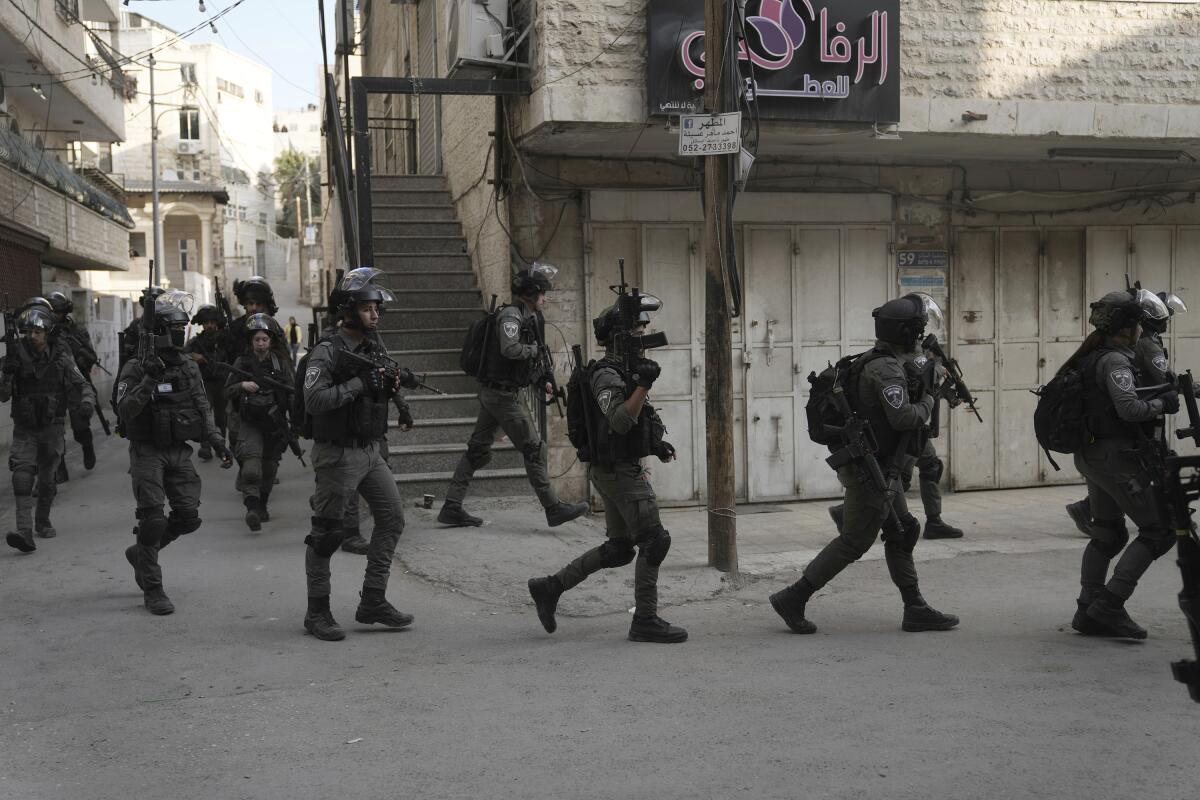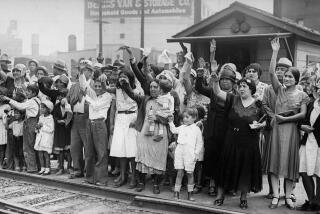Op-Ed: Palestinians in Israel have new cause to fear for their future

- Share via
In recent days, there has been an alarming escalation of violence in Israel and Palestine, adding victims to what had been a deadly year in 2022. Last Thursday, the Israel Defense Force launched a raid against militants in the Jenin refugee camp, killing nine Palestinians. The next day, a 21-year old Palestinian from East Jerusalem fired on Israeli Jews near a synagogue, murdering seven of them.
Barely a month into 2023, these two episodes mark — and have contributed to — a new cycle of violence. They also add to a deepening political crisis in Israel.
Every Saturday night, tens of thousands of Israelis of diverse political perspectives have been gathering in Tel Aviv and other cities to protest the new far-right Netanyahu government, including the proposal to make the judiciary entirely subservient to the ruling political class.
Even more ominous is the threat that key members of the Netanyahu government are seeking a larger opportunity: to create a state where Palestinians, who make up about 20% of the population of Israel, would no longer be welcome as its citizens. Sadly, the terror attack at the synagogue on Friday could further the resolve of those in positions of power today.
We have heard from Palestinian Israeli colleagues and friends about their fears of a second “Nakba,” referring to the forced expulsion and dispossession of hundreds of thousands of Palestinians from what is now Israel during the war of 1948. Many Palestinians speak of an “ongoing Nakba” since 1948, by which they mean Israel’s mix of discriminatory policies toward Palestinian citizens, restrictions on land possession and movement, and the 55-year old occupation of the West Bank.
But what we are hearing about now is something more dire, propelled by newly appointed government ministers such as Itamar Ben-Gvir and Bezalel Smotrich, who have expressed a desire to see the land of Israel without Arabs.
This may seem to some to be an exaggerated fear. But Smotrich, now the finance minister, told Arab Israeli Knesset members in 2021 that they were “here by mistake because Ben Gurion didn’t finish the job and throw you out in 1948.” Ben-Gvir, for his part, is a disciple of the racist Israeli American rabbi, Meir Kahane, who called for strict segregation between Jews and Arabs in Israel and depriving the latter of citizenship rights. Ben-Gvir himself was convicted in 2007 of incitement against Arabs; more recently, he has spoken of the desire to encourage Arabs to leave the country and to expel undesirables such as stone throwers and Palestinian Israeli members of the Knesset.
It is particularly alarming that Ben-Gvir has assumed the position of minister of National Security with control over the police and border patrol. Last week, he warned of the prospect of yet another Israeli military engagement in Gaza. In tandem, he has also revived the idea of creating a civilian guard to deal with social upheaval in Israel in its wake.
For Palestinian Israelis, the call to arm civilians and the specter of vigilantism are haunting reminders of the brutal intercommunal violence that broke out in May 2021 at the time of another Israeli military conflict with Hamas in Gaza. The difference now is that an extremist like Ben-Gvir, with a track record of anti-Arab provocation, controls the levers of law enforcement.
There should be no mistake. Conditions of war, such as in a future Gaza conflict — or, for that matter, a wave of terror attacks even if perpetrated by Palestinians from the West Bank rather than by citizens of Israel — provide cover and rationale for a population transfer. We have seen this most recently in the deportation of civilians from Ukraine and in migration from war-torn regions.
In the Israeli context, political leaders such as David Ben-Gurion, Israel’s founding prime minister, had long imagined the transfer of local Arab residents as a policy option. They also saw the 1948 war as an opportunity to create as large a territory as possible for Jews — with as small an Arab population as possible. While they did not achieve their maximal territorial goals in 1948, the overwhelming majority of the local Palestinian population was encouraged or compelled to leave their land.
Palestinian Israelis live in fear of a repetition of this scenario today. What is perhaps most insidious is that this fear may already be doing the work of transfer. Palestinian Israelis have begun to seek foreign passports as well as business and educational opportunities abroad for themselves and their children. Families that have been on the soil of the Holy Land for centuries are considering leaving.
Israel’s Declaration of Independence calls for “complete equality of social and political rights to all its inhabitants irrespective of religion, race or sex.” It is a moral and political imperative that all of us — and especially Jews who know well the pain of dispossession — insist that the current government adhere to this core democratic principle and prevent any attempt by extremists to force Palestinian citizens of Israel from their homes and country.
David N. Myers teaches Jewish history at UCLA and is the president of the New Israel Fund. Daniel Sokatch is the CEO of the New Israel Fund.
More to Read
A cure for the common opinion
Get thought-provoking perspectives with our weekly newsletter.
You may occasionally receive promotional content from the Los Angeles Times.










